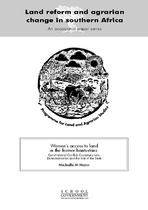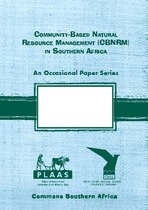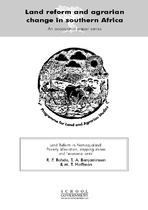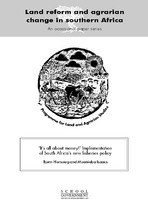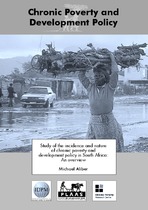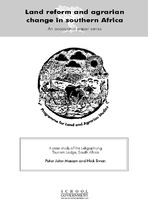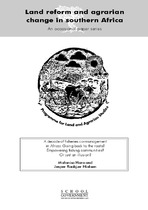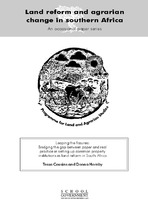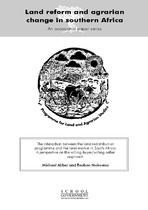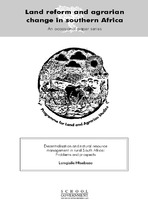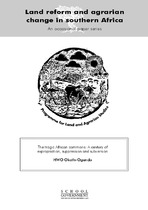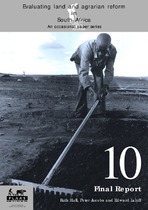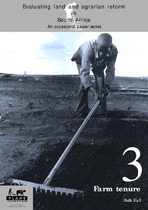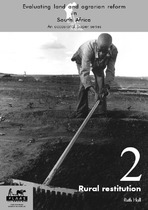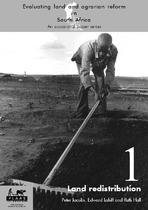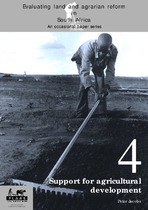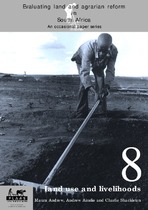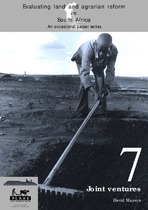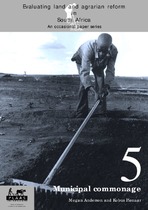Browsing Occasional Papers Series by Issue Date
Now showing items 1-20 of 59
-
Women's access to land in the former bantustans: Constitutional conflict, customary law, democratisation and the role of the state
(Institute for Poverty Land and Agrarian Studies (PLAAS), 2000)The transition to local democratic institutions in the former bantustans of South Africa will not in itself fulfil the constitutional imperative for the promotion of gender equality, specifically in relation to womenís ... -
Women's access to land in the former Bantustans: Constitutional conflict, customary law, democratisation and the role of the state
(Institute for Poverty Land and Agrarian Studies (PLAAS), 2000)The transition to local democratic institutions in the former bantustans of South Africa will not in itself fulfill the constitutional imperative for the promotion of gender equality, specifically in relation to women's ... -
Constituting the commons in the new South Africa
(Institute for Poverty Land and Agrarian Studies (PLAAS), 2000)This set of papers results from participation by staff members of the Programme for Land and Agrarian Studies in the eighth biennial conference of the International Association for the Study of Common Property, held at ... -
Land reform in Namaqualand: Poverty alleviation, stepping stones and economic units
(Institute for Poverty Land and Agrarian Studies (PLAAS), 2001)This paper examines the consequences of land reform for communal livestock farmers in Namaqualand. It investigates the likely outcomes of recent commonage acquisitions and tenure reform in the former ëColoured Reservesí ... -
'It's all about money! Implementation of South Africaís new fisheries policy
(Institute for Poverty Land and Agrarian Studies (PLAAS), 2001)This paper was originally written as part of an economics study commissioned by the Chief Directorate: Marine and Coastal Management (MCM) of the South African Department of Environmental Affairs and Tourism (DEAT). Since ... -
Study of the incidence and nature of chronic poverty and development policy in South Africa: An overview
(Institute for Poverty Land and Agrarian Studies (PLAAS), 2001)The purpose of this study is fourfold: first, to summarise the current state of knowledge about chronic poverty in South Africa; second, to describe the range of existing governmental and civil society initiatives which ... -
A case-study of the lekgophung tourism lodge, South Africa
(Institute for Poverty Land and Agrarian Studies (PLAAS), 2002)The Lekgophung Lodge is a community-owned wildlife tourism lodge, located in the western part of the Madikwe Game Reserve in the North West Province of South Africa. The Lekgophung community is settled near the western ... -
A decade of fisheries co-management in Africa: Going back to the roots? Empowering fishing communities? Or just an illusion?
(Institute for Poverty Land and Agrarian Studies (PLAAS), 2002)This paper provides an overview of co-management in Africa and the historical, political and paradigmatic reasons for the shift. The historical context is important when analysing the performance of the regime. The main ... -
Leaping the fissures: Bridging the gap between paper and real practice in setting up common property institutions in land reform in South Africa
(Institute for Poverty Land and Agrarian Studies (PLAAS), 2002)New common property institutions (CPIs) were created in South Africa soon after 1994 to enable self-constituted groups of people a choice about how they wished to acquire, hold and manage land. They were to provide rural ... -
The interaction between the land redistribution programme and the land market in South Africa: A perspective on the willing-buyer/willing-seller approach
(Institute for Poverty Land and Agrarian Studies (PLAAS), 2002)The debate rages on, in South Africa and elsewhere, about the desirability and efficacy of the willing-buyer/willing-seller approach to land redistribution. In South Africa, the willing-buyer/willing-seller approach is ... -
Decentralisation and natural resource management in rural South Africa: problems and prospects
(Institute for Poverty Land and Agrarian Studies (PLAAS), 2002)In this paper, the issue of decentralisation and natural resource management will be interrogated primarily through a focus on local government reform and land administration. This focus illuminates problems that are on ... -
The tragic African commons: A century of expropriation, suppression and subversion
(Institute for Poverty Land and Agrarian Studies (PLAAS), 2002)This paper examines the nature of the African commons as a property system; analyses the extent of damage which was inflicted upon it during one hundred years of exploitation, suppression and subversion; explains why, in ... -
Evaluating land and agrarian reform in South Africa : Final Report
(Institute for Poverty Land and Agrarian Studies (PLAAS), 2003)Land dispossession was a key feature of racism under colonial rule and apartheid in South Africa. More than 3.5 million people were forcibly removed in the period 1960 to 1983 alone, through homeland consolidation, removals ... -
Evaluating land and agrarian reform in South Africa : Farm tenure
(Institute for Poverty Land and Agrarian Studies (PLAAS), 2003)Farm dwellers are among the poorest South Africans. Most have access to residential land only. A minority has access to grazing land for their livestock or to arable land for cultivation, in return for which they may be ... -
Evaluating land and agrarian reform in South Africa : Rural restitution
(Institute for Poverty Land and Agrarian Studies (PLAAS), 2003)During the negotiated transition to democracy, many South Africans expected that liberation would bring the return of land they had been dispossessed of under colonialism and apartheid, but the terms on which the transition ... -
Evaluating land and agrarian reform in South Africa : Land redistribution
(Institute for Poverty Land and Agrarian Studies (PLAAS), 2003)Land dispossession during the colonial era and the decades of apartheid rule produced a highly unequal pattern of land ownership and widespread rural poverty in South Africa. When a democratically elected government came ... -
Evaluating land and agrarian reform in South Africa : Support for agricultural development
(Institute for Poverty Land and Agrarian Studies (PLAAS), 2003)In South Africa, land reform has to be more than securing land rights and transferring a certain number of hectares to black people. Broadly speaking, it has to take into account the uneven spatial development patterns ... -
Evaluating land and agrarian reform in South Africa : Land use and livelihoods
(Institute for Poverty Land and Agrarian Studies (PLAAS), 2003)This paper addresses how land reform can contribute to enhancing land-based livelihoods. South African agriculture is often characterised as being divided into two types: freehold tenure/ commercial agriculture vs. ... -
Evaluating land and agrarian reform in South Africa : Joint ventures
(Institute for Poverty Land and Agrarian Studies (PLAAS), 2003)Joint ventures (JVs) are an increasingly common feature of the process of land and agrarian reform in South Africa. They involve black people who currently have land rights or who are land reform beneficiaries and will be ... -
Evaluating land and agrarian reform in South Africa : Municipal commonage
(Institute for Poverty Land and Agrarian Studies (PLAAS), 2003)This paper compares the performance of the Municipal Commonage Programme of the Department of Land Affairs (DLA) with the objectives stated in the White Paper on South African Land Policy (DLA 1997). This paper will review ...

